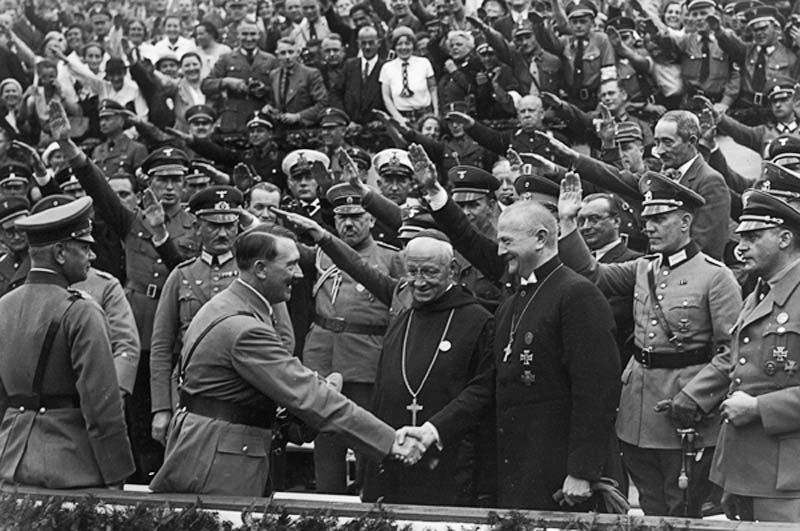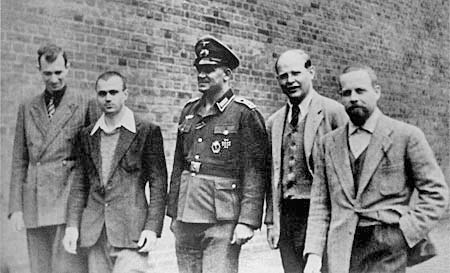A Cautionary Tale: The Failure of the German Church to Oppose Nazism
By Colin Postma
Over the past few months, ARPA staff have been discussing Eric Metaxas’ book “Bonhoeffer – Pastor, Martyr, Prophet, Spy,” as part of our weekly staff calls. Dietrich Bonhoeffer was a German pastor who is remembered for his opposition to the Nazis in Germany in the 1930s and 1940s. He was executed in a concentration camp in April 1945, just days before Hitler committed suicide and the war came to an end.
One of the most striking things about entering the life of Bonhoeffer through Metaxas’ narrative has been watching the floundering of the German Church from the very early years of Hitler’s rise to power. We read with amazement how the church compromises here, fails to speak out there, allows more state involvement, succumbs to a bit more Nazi philosophy. Still, the German church is not that different from the church today, whether seeking general acceptance and growth, or seeking simply to take the path of least resistance.
It is all too easy to look at the Lutheran State church of the 1930s and 40s and ask questions, ‘What were they waiting for?’ or ‘How could they do nothing?’ Unfortunately, as the saying goes, ‘hindsight is 20/20’ so without understanding the real situation the church was in, the history that influenced its decisions and the vision it had of the future we cannot cast judgement.
Metaxas’ portrayal of the German church is a cautionary tale. If we do not learn from them we too will succumb to compromise and be complicit in evil. Some within the German Church simply believed that civic duty required supporting the Fuhrer and the Nazi party. Others more enthusiastically welcomed Hitler as an earthly hero who would bring about national acclaim. Both ultimately compromised or abandoned the eternal truths they were called to represent as the religious leaders.
The primary state church at the time of Bonhoeffer was Lutheran. The German Evangelical Church looked to Martin Luther as its forebear – the great German Reformer whose 95 theses nailed to the door in Wittenberg signaled the beginning of the Protestant Reformation. Luther’s strong stance against the Roman Church held a place of pride in the hearts of the German people, a story central to the creation of the German state itself. Unfortunately, as Luther began to lose his sanity in his later writings, he began to exhibit strong anti-Semitic sentiments. The ascending Nazis manipulated these centuries-old ramblings of Luther to convince the German Church of the validity of their racist policies.
German Nationalist Sentiments
With the massive loss of life of the First World War and the economic downturn that followed for the German people, there was a rise in dissatisfaction with the nobility and the leadership of the country. The German people were not short on power, knowledge, or ability, and a strong Prussian militaristic culture pervaded the country. The general belief was that the two bulwarks of their ancient society – the Kaiser and the Church – had failed to achieve the victory they felt they deserved. They blamed weak leaders for their trouble. Thus, arose this idea that what was needed was a true leader, a Fuhrer.
Hitler did not create this idea, but the Nazis did manage to use it to their advantage and crowned Hitler as the ‘true leader’ the people had been looking for all this time. The people of Germany were swept up by the massive propaganda displays of Nazi strength and were led to believe that this man really was the one to bring back the splendour and honour of the ancient German people. They were the descendants of the fiercest warriors on the continent of Europe, they had not had a fair fight in the First War, and they had been persecuted thereafter through the Treaty of Versailles. Nationalism accelerated to a religious fervour.
The German Lutheran Church
The German church throughout the Nazi period could be described in three groups: those Nazi appointees and sympathisers who actively supported Hitler, those who didn’t want to stand in the way of Hitler due to national sentiment and a perceived duty to the state, and the smallest group – those who actively resisted. This last group began to call themselves the ‘Confessing Church’ and included Bonhoeffer and a contingent of other orthodox pastors.
The second group, the silent majority, continued to think that Hitler would eventually stop meddling with the church, and would let them go on as they always had. Metaxas points out that in 1934, after fighting with the Nazi-appointed bishops, that the Church “still thought of Hitler as the reasonable one in all of this, as the man who would settle things in their favour.” Already in 1934, the Nazi-appointed Reichskirche bishops proposed the ‘Aryan Clause’, which was widely accepted. It removed anyone of Jewish descent from church governance. A ‘Decree for the Restoration of Orderly Conditions in the German Evangelical Church’ was also enacted, which muzzled any discussions about the church struggle and which integrated church youth groups into the Hitler Youth. Bonhoeffer and the Confessing Church faced an uphill struggle, not only against the Nazis, but also in working with their ecclesial colleagues and friends who were willing to give in at every stage. By the time the silent majority saw that the Nazi onslaught within the church and against the Jews was not going to abate, their compromise and inaction had already crippled them to the point that resistance was useless.
Niemoller was a Lutheran pastor supportive of the Nazis in the early years, but who eventually spoke out against the regime, earning him seven years in a concentration camp. He later wrote these words which reflect the general sentiment of the German Church, holding their own personal security as the highest good above speaking the truth:
First, they came for the Socialists, and I did not speak out—
Because I was not a Socialist.Then they came for the Trade Unionists, and I did not speak out—
Because I was not a Trade Unionist.Then they came for the Jews, and I did not speak out—
Because I was not a Jew.Then they came for me—and there was no one left to speak for me.
Deadly Compromise
The Devil seeks to undermine truth, not by directly opposing it, but by small steps of compromise bringing us further and further away from the truth. Instead of looking to the Saviour who really can save, the German people put their faith in an earthly saviour, who later revealed himself to be a demon. We should heed this warning and recognize that compromising may bring us peace for a short while, but eventually, we or our children will face even stronger attacks.
Psalm 146:3-4 says, “Put not your trust in princes, in a son of man, in whom there is no salvation. When his breath departs, he returns to the earth; on that very day his plans perish.” This sobering message of warning challenges us to stay true and promises that the truth will one day win out.
A Prophetic Witness
In January 1934, Bonhoeffer preached a sermon on Jeremiah. Jeremiah was called to stand in opposition to the paganism and ungodliness of his time, to preach the truth of God in the face of evil with the knowledge that he would be entirely unsuccessful. Jeremiah was called to be faithful, and that was all. Bonhoeffer saw the Confessing Church as 20th century prophets to Germany. Like Jeremiah, whose likely destiny was martyrdom, he remained faithful standing in opposition to the Nazi philosophy.
Nazi Germany’s faith in science became toxic when mixed with the evolutionary theories of Darwin. Arthur de Gobineau, influenced by Darwin’s Origin of Species, wrote some of the first works discussing the idea of a master race – this field of thought is now called Social Darwinism or the social application of Darwinian science. Social Darwinism, brought to fruition in Nazi extermination camps, is in direct opposition to the truth that every human being is made in the image of God and is therefore equally valuable. The modern practices of abortion and euthanasia similarly deny the inherent worth of all human beings in God’s eyes.
The Faithful Nation Will be Blessed
Someone may ask why Christians are so stubbornly attached to the Bible. Simply put, because it is Truth. It is the Truth and it has been given to us by God as a means of understanding Him, a means of understanding the world around us, as a guide teaching right and wrong. Many outside the faith see the laws and requirements of God’s Word as arbitrary. They see a god whose only pleasure is in controlling and manipulating his creatures. But the truth is very much the opposite. God’s word is ultimately a guide to keep his people safe, to keep us from the dangers that so easily ensnare us and ruin our faith, lives, families, societies, and nations. God’s word is true and those who obey it will ultimately find blessing from Him. Those who disobey and are unrepentant will find disaster.
Psalm 67 provides this message clearly:
May God be gracious to us and bless us
and make his face to shine upon us, Selah
that your way may be known on earth,
your saving power among all nations.
Let the peoples praise you, O God;
let all the peoples praise you!
Let the nations be glad and sing for joy,
for you judge the peoples with equity
and guide the nations upon earth. Selah
Let the peoples praise you, O God;
let all the peoples praise you!
The earth has yielded its increase;
God, our God, shall bless us.
God shall bless us;
let all the ends of the earth fear him!
The Truth Will Win
This is the meta-narrative of the Christian worldview, the story that has been told for 2000 years. This is the story the martyrs, including Confessing Church members in Nazi Germany, clung to and died for. They were willing to stand up to Hitler because they knew that evil has been conquered by the Cross of Christ. They knew that kingdoms may rise and fall, but the Word of God stands forever. It is this Truth that has outlasted Empires, Kings, and Nations, and will live on because it is the Truth, and the Truth will be victorious.
It is this Truth that we must stand for, it is the Biblical Truth that ARPA seeks to share with our civil government leaders, and it is the Truth that we must share with others. As Mathew 5:14-16 says: “You are the light of the world. A city set on a hill cannot be hidden. Nor do people light a lamp and put it under a basket, but on a stand, and it gives light to all in the house. In the same way, let your light shine before others, so that they may see your good works and give glory to your Father who is in heaven.”

